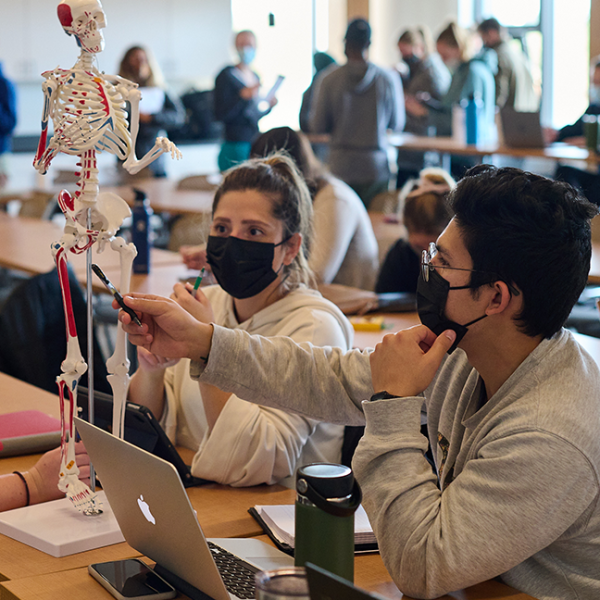
Oregon State University – Cascades launched the first doctor of physical therapy degree program at a state public university this fall, welcoming an initial cohort of 45 students.
The doctor of physical therapy, or DPT, program is anticipated to produce clinicians to address the need for physical therapists in Oregon and across the nation, especially in rural areas, according to Christine Pollard, a professor and founding director of the DPT program.
“Students will engage in cutting-edge research, as well as with experts practicing in the field, and bring the latest knowledge into their own practices, as they launch careers that support healthier communities,” said Pollard.
Beginning in their first year, DPT students will work with patients in local physical therapy clinics under the supervision of practicing clinicians. Students will engage in 35 weeks of clinical internships during the three-year program, participating in at least one clinical rotation in a rural or underserved community.
During the program, teams of students will also embark on capstone projects in the field focusing on areas including oncology, disparity in healthcare access in diverse populations, interventions for neurological conditions, and biomechanics.
Students will learn in the newly opened Edward J. Ray Hall on the OSU-Cascades campus. Pollard and faculty from the DPT program helped design state-of-the-art classrooms, labs and research areas in the building, including a classroom with 24 treatment tables and a clinical skills classroom where students train on equipment used in physical therapy settings.
The program also is served by a specialized laboratory for cadavers, which support students’ understanding of musculoskeletal anatomy and neuroanatomy. The cadaver lab is the only one of its size in Oregon east of the Cascades range.
More than a third of the inaugural DPT class identify as students of color, which is promising for the future of the profession, Pollard said.
“Attracting students with a diversity of perspectives and experiences to the physical therapy profession is critical in order to reflect the diversity of the society we serve,” she said.
The variety of backgrounds represented within the student cohort have impressed Brett Traeger, a DPT student from Mt. Angel, Ore. His classmates include students like him who recently graduated with a bachelor’s degree, as well as others with employment experience in the health field pursuing career changes.
“I think I’d like to eventually practice in a small town, where I can really get to know people and have an impact on their lives and on the community,” said Traeger.
The DPT program is the only one offered at a research university in Oregon. It is based within Oregon State’s College of Public Health and Human Sciences and draws from the college’s focus on teaching, research and community outreach.
The program employs seven full-time faculty, 25 associate faculty who are primarily practicing physical therapists in Central Oregon, as well as other experts from around the state. Faculty represent a variety of specializations including orthopedics, neurology, physiology, sports medicine, biomechanics and oncology.
“We’re fortunate to be located in a region that attracts top physical therapists who are excited to share their expertise with future clinicians,” said Pollard.
“The doctor of physical therapy program is an excellent addition to our region,” said Dave Haglund, director of rehabilitation and wound & ostomy at St. Charles Health System. “It gives us access to the latest information in the field and a place we can partner to develop future practitioners.”
With applications now closed for the fall 2022 cohort of DPT students, Pollard feels positive about full enrollment in 2023 with three cohorts and 135 students.
About OSU-Cascades: Oregon State University’s campus in Bend brings higher education to Central Oregon, the fastest growing region in the state. Surrounded by 2.5 million acres of mountains and high desert, OSU-Cascades is a top-tier research university where small classes accelerate faculty-student mentoring. Degree programs meet industry and economic needs in areas such as innovation and entrepreneurship, natural ecosystems, health and wellness, and arts and sciences, and prepare students for tomorrow’s challenges. OSU-Cascades is expanding to serve 3,000 to 5,000 students, building a 128-acre campus with net-zero goals.